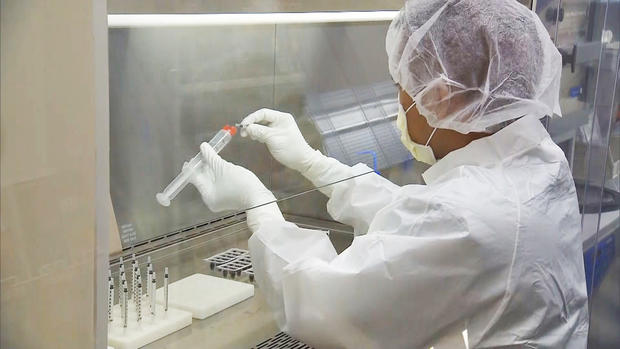Meningitis cases rise to 105 infected, 8 dead
Updated 1:45 p.m. ET
In an ongoing meningitis outbreak in the United States, 105 people have been infected including eight people who died, health officials announced Monday afternoon.
States with reported infections of fungal meningitis include Florida (four cases), Indiana (11 cases), Maryland (five cases including one death), Michigan (21 cases including two deaths), Minnesota (three cases), North Carolina (two cases), Ohio (one case), Tennessee (35 cases including four deaths) and Virginia (23 cases including one death).
The infections are tied to vials of a steroid, preservative-free methylprednisolone acetate, that were given as injections to patients to relieve back pain. The recall was first announced in late September after investigators found contaminants in an unopened vial of the steroid. The company had also voluntarily suspended operations at that time to help with the investigation.
New England Compounding Center, the drug compounding company at the center of a multi-state fungal meningitis outbreak, announced it would expand its current recall to all of its products that are currently in circulation.
The Framingham, Mass.- based company's initial recall involved 17,676 vials that were shipped to75 facilities in 23 states.
Prior to the expanded recall, officials from the Food and Drug Administration and Centers for Disease Control and Prevention had told health professionals not to use any products distributed by the center, which was licensed to operate in all 50 states.
Meningitis is swelling of the protective membranes covering the brain and spinal cord, called the meninges. The severity of illness and the treatment for meningitis differ depending on the cause, so knowing the specific cause of meningitis is important, the CDC said.
- Back pain patients wait and worry over meningitis risk
- CDC: More than 90 people ill with meningitis
- Meningitis outbreak spotlights risks of drug mixing
"The FDA had previously issued guidance for medical professionals that all products distributed by NECC should be retained and secured," the company said in announcing the expanded recall Saturday. "While there is no indication at this time of any contamination in other NECC products, this recall is being taken as a precautionary measure"
A full list of products included in the expanded recall can be found on the FDA's web site.
"Clinics, hospitals and healthcare providers that have product which is being recalled should stop using the product immediately, retain and secure the product," the company said.
In several infected patients, the meningitis was found to be caused by a fungus that is common in the environment, but rarely causes the disease. This form of meningitis is not contagious like viral and bacterial counterparts. The source of the fungus has not yet been identified, according to the CDC, and the cause of infections in the other patients is still being assessed.
Infected patients have had very mild symptoms, including slight weakness, slightly worsened back pain or even a mild headache, the CDC said. Patients have had symptoms generally starting from 1 to 4 weeks after their injection. Patients who had an epidural steroid injection since May 21, 2012, should talk to their doctor as soon as possible if they are experiencing the previously mentioned symptoms in addition to fever, sensitivity to light, stiff neck, slurred speech or increased pain and redness at the injection site.
If patients are concerned about which product was used in a procedure, they should first contact the physician who performed it, health officials said.
"FDA is working closely with the CDC and state partners to investigate an outbreak of meningitis among patients who had received an epidural steroid injection," the agency said in a statement Friday.
